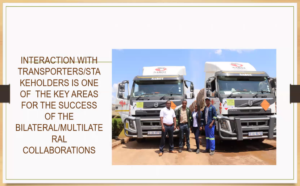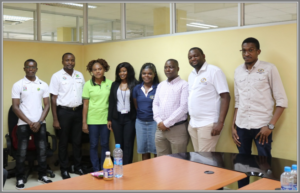 The Radiation Protection Authority and its counterparts in the radiation sector from Zimbabwe, and Congo DRC in collaboration with Software company and the International Science and Technology Centre hosted recently a virtual and physical training on the use of the web-based system for monitoring nuclear and radioactive materials during transport. A real tine exercise followed the training that took place from 15 to 26 November, 2021, in the pursuit of the objectives of the EU project MC5.01/15b Support to the Southern African States in Nuclear Safety and Safeguards, funded by the EU’s Instrument for Nuclear Safety Cooperation. On 3 December 2021 a meeting of the participants was convened to take stock of the results and the lessons learned.
The Radiation Protection Authority and its counterparts in the radiation sector from Zimbabwe, and Congo DRC in collaboration with Software company and the International Science and Technology Centre hosted recently a virtual and physical training on the use of the web-based system for monitoring nuclear and radioactive materials during transport. A real tine exercise followed the training that took place from 15 to 26 November, 2021, in the pursuit of the objectives of the EU project MC5.01/15b Support to the Southern African States in Nuclear Safety and Safeguards, funded by the EU’s Instrument for Nuclear Safety Cooperation. On 3 December 2021 a meeting of the participants was convened to take stock of the results and the lessons learned.
Related to the training activities, the project team organized an exercise to stimulate the transportation of uranium ore concentrate from country to country and to monitor step by step the provisions applied in the individual countries, at the border crossings. The exercise allowed also to assess the interaction at the regional level on how the monitoring system could be used to track the movements of Uranium Ore Concentrate and other Radioactive Materials during transport.
The exercise involved tracking of a consignment from the start point in Lubumbashi in DRC, through Zambia until the end point at Beit Bridge in Zimbabwe, totalling a distance of 1577.50Km.
Dr Kamen Velichkov, ISTC Senior Program Manager and Diplomatic Advisor, commended all the African partners for collaborating to enhance the nuclear security and safety during transportation of nuclear and radioactive materials through their territories.
In a speech read on his behalf by Zambia Radiation Protection Authority (RPA) Chief Executive Officer Boster Siwila, RPA Board Chairperson Brig. Gen. Dr. Adrian Maleya, noted that the vehicle tracking system is an excellent security and fleet management solution. Dr. Maleya said that the technology will be used as a tool to determine the location of a vehicle, using different methods ranging from GPS to other navigation system operating via satellite and ground based stations, to combat illicit trafficking of nuclear or radioactive material. He further noted that the training would enhance the already existing collaboration between DRC and Zambia and provide an opportunity for Zambia to sign an agreement with Zimbabwe. The Chairperson urged participants to make use of the system, so as to enhance nuclear safety and security in the region.
At the closing event, Nikolay Palov, CEO of Software Company, the ITS developer, commented that the company has conducted twelve trainings for countries from the southern region of Africa. He noted that the training has taken place in both virtually and in-person formats and that the company has provided GPS tracking devices, mobile phones and computers to the participating countries. In his words, the Software Company was delighted to conduct the training and the real time exercise.

Justice Chipuru, CEO, Radiation Protection Authority – Zimbabwe (RPAZ) expressed appreciation of the Project’s deliverables that include the web-based tracking system which will enhance security and accountancy during transport of Uranium Ore Concentrate, and of nuclear and radioactive materials. He also stressed the need for collaboration of various stakeholders who are involved in the transport, import and export of these materials:“There is need for bi-lateral and multi-lateral agreements among SADC member states that will address and ease control of transboundary movements of nuclear and radioactive materials that would be brought about by harmonisation of transport regulations in the region and beyond”.
At the same training exercise, Prof. Dr. Florimond Nyamonga Kabanda, President, Comite National de Protection contre les Rayonnements Ionisants, DR Congo, thanked everyone present for joining their efforts in conducting the training and exercise, which was held virtually in the three countries and physically in Zambia. He asked participants to properly assimilate the lessons they learnt for use in real cases to enhance safety and security during transport where radioactive materials are most vulnerable. “I hope that this framework will strengthen cooperation between our countries to better combat illicit trafficking of nuclear and other radioactive materials,” said Prof. Kabanda.
Presentations on the results and lessons learned were made by: Gabriela Miteva, Senior expert, Software Company; Nokutola Ncube, Senior Manager, RPA – Zimbabwe; and Melody Nsofwa, Head of Department, RPA –Zambia. The training provided evidence that countries in the SADC region should opt for a bilateral/multilateral agreement/protocols in nuclear safety, security and safeguards with the purpose of effective information sharing and exchange among SADC member states.
Note: A full version of the video on the training, created by ZNBC Created Studio Production can be retrieved at: https://sadcproject.novotika.com/online-cross-country-training-2021/video/
YouTube:

